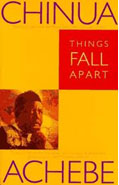 On Friday, March 22, we learned the sad news that Chinua Achebe had passed away at age 82. One of the giants of African literature—indeed, of world literature—Achebe’s 1958 novel, Things Fall Apart, explores the tragic consequences of cross-cultural misunderstanding through the life and actions of an Ibo man named Okonkwo.
On Friday, March 22, we learned the sad news that Chinua Achebe had passed away at age 82. One of the giants of African literature—indeed, of world literature—Achebe’s 1958 novel, Things Fall Apart, explores the tragic consequences of cross-cultural misunderstanding through the life and actions of an Ibo man named Okonkwo.
To honor Achebe’s memory and to encourage further exploration of African literature, we offer this sampling of novels by African authors as suggested reading. Each link will take you to the Puget Sound WorldCat record, where you can note the book’s location in Collins Library or request a copy from SUMMIT.
Arrow of God, by Chinua Achebe. During the 1920s in Eastern Nigeria, a son’s overzealous conversion to Christianity brings about a clash between his father, the Chief Priest, and the British District Officer.
Everything Good Will Come, by Sefi Atta. Enitan Taiwo and Sheri Bakare are two Nigerian girls in 1971, one who is prepared to manipulate the traditional system and one who attempts to defy it.
So Long a Letter, by Mariama Ba. Ramatoulaye Fall, a recently widowed Senegalese schoolteacher, writes a letter to a friend recounting her struggles to survive after her husband takes a second wife.
Nervous Conditions, by Tsitsi Dangarembga. Tambu leaves her rural village in colonial Rhodesia to go to a missionary boarding school headed by her wealthier, British-educated uncle.
Links, by Nuruddin Farah. Returning to Mogadishu, Somalia, from New York after a twenty-year exile, Jeebleh finds a troubled and devastated city ruled by clan warlords and patrolled by violent gangs of thugs.
Bones, by Chenjerai Hove. Marita, a farmworker, goes to the city in search of her only son, but is killed by the government. Her death sets in motion of a series of additional tragedies.
Ways of Dying, by Zakes Mda. Toloki, a professional mourner in South Africa, is reunited with a woman from his village.
Beneath the Lion’s Gaze, by Maaza Mengiste. After his physician father, Hailu, is jailed and his younger brother, Dawit, joins an underground resistance movement, Yonas prays to God for an end to the violence in Addis Ababa, Ethiopia, and the rest of the country on the eve of revolution in 1974.
Efuru, by Flora Nwapa. After two unsuccessful marriages and the death of her only child, Efuru becomes a woman to suspect in her small Nigerian village.
The Famished Road, by Ben Okri. The narrator, Azaro, is an abiku, a spirit child, who in the Yoruba tradition of Nigeria exists between life and death.
Submitted by Peggy Burge, Humanities Librarian
